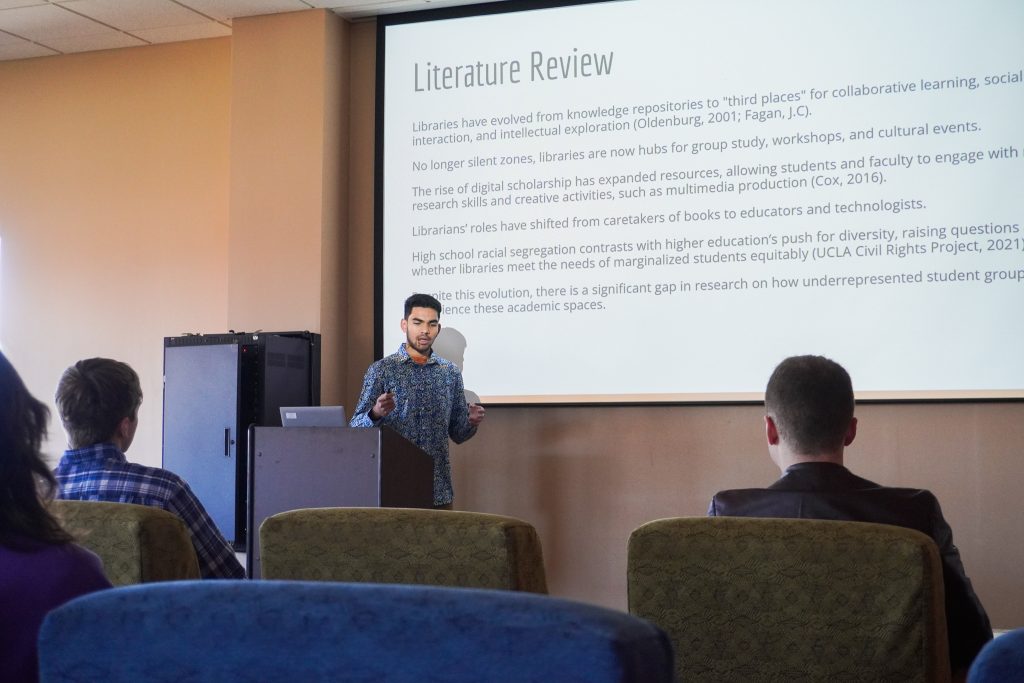The Office of External Scholarships and Undergraduate Research Center hosted an undergraduate research exhibition on Thursday.
Part of the LOCO festival, a weeklong series of events focused on global immigration and human rights, four undergraduates shared their research — three from the Source Project and one who worked as a Library Research Scholar, with presentations on topics ranging from education and local issues like homelessness. Between presentations, students mingled and enjoyed refreshments.
“I noticed a lot of the research today was focusing on the Binghamton area, so I think it’s really important because I know a lot of students are not from the Binghamton area,” said Sasha Novikova, a senior majoring in economics. “But since we live here, it’s important to know about the community and the issues in the community — like the homelessness issue that they talked about.”
Most of the students who presented centered their research around the relevance of immigration and human rights to the University and its surrounding area. Liam Spiro, a sophomore majoring in biology, participated in the Source Project’s Debating Basic Income stream and presented his research on the impact of a guaranteed annual income for Binghamton’s homeless population.
Spiro shared that a guaranteed annual income could improve physical and mental health, housing stability, social relations and personal savings for the unhoused. In the Binghamton area, mental health counseling coupled with guaranteed annual income would be the most effective approach, he said, adding that luxury student housing is partially responsible for worsening the housing shortage.
Deniz Gulay, a sophomore majoring in history, presented on the history of Eastern Orthodox churches in Binghamton, drawing ties to global immigration, at this year’s festival. He dove into Binghamton’s industrial past, when waves of immigrants from Eastern Europe came to the area as laborers, discussing how Eastern Orthodox churches provide a space for immigrants to celebrate their native culture and American identity.
Clay Jeon, a sophomore majoring in philosophy, politics and law who also presented at the event, said it is important for people to talk about what immigration and being an American means.
“It sounds somewhat simple, but it’s quite difficult for people to have productive conversations about this type of stuff,” Jeon said. “So I think it’s nice to talk about it in a more academic sense so that we have more empathy for each other.”
Jeon presented his own research on how redlining — a practice that discriminates against neighborhoods with large minority communities by withholding financial services, like credit access — made lasting impacts on sentiment toward high school education in the Bronx. He used student satisfaction surveys as metrics to compare schools in redlined areas versus non-redlined areas, highlighting that education can be evaluated without relying on SAT scores or college matriculation rates.
Anindya Debnath, a senior double-majoring in political science and economics, worked as a Library Research Scholar to document how students from underrepresented backgrounds experience library spaces. His research employed a photo-capture system where students took photos of certain spots in BU’s three libraries — Glenn G. Bartle Library, the Science Library and the University Downtown Center Library — and captioned them with their responses to them. His research, in partnership with BU Libraries, aims to address how higher education spaces can serve underrepresented students differently. (7: 6:45 – 7:30)
“The students want to actively be a part of this community, see how we can help, how we can make it better, make Binghamton a city that more people can come to, be proud of being a resident,” Debnath said. “It’s just really inspiring in that sense, that students really care about these issues in a sense that older generations may not, especially older generations within academia.”
The Source Project offers opportunities to first-year students interested in conducting research in humanities and social science-aligned fields. Students can work in different research streams — this year’s options included The New Authoritarianism, Mapping American Prejudice and Climate Justice, among others.
“Undergraduate research is incredibly important because it is a way to foster student curiosity and innovation,” said event host and Source Project Program Coordinator Caroline Antalek ‘16, who is working toward a Master of Public Administration at BU. “I think that our students at Binghamton are so incredibly bright, motivated and ambitious, that the level of intellect at this event has really impressed me. They are bringing awareness to real-world problems that can be researched further, that can present real-world solutions.”
Editor’s Note: One of the event’s presenters, Deniz Gulay, is a Pipe Dream Opinions columnist. He had no part in the writing or editing of this article.



